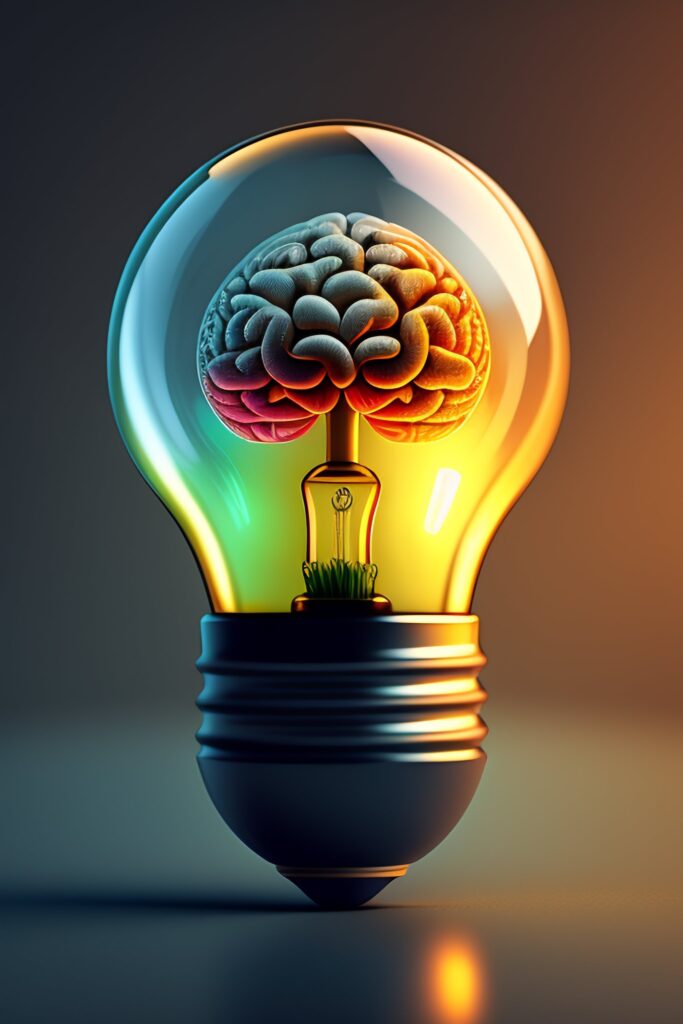Intuition is a fascinating aspect of the human experience that has intrigued philosophers, scientists, and people of all cultures throughout history.
Intuition stands as a fundamental pillar of the human experience, an enigma that has captured the attention of thinkers and curious people throughout the centuries.
In essence, we are talking about that intrinsic capacity that allows us to understand situations, events, thoughts, or emotions almost instantaneously. In this way, intuition guides us toward quick decisions, without the need for exhaustive logical analysis.

In other words, intuition is that visceral feeling of “knowing” something, even if we lack immediate rational justification. We can identify it when we understand things suddenly, without a conscious reasoning process. It manifests as a feeling, a primal instinct, an unexpected hunch, or that soft voice that resonates within us.
Similarly, intuition can also be presented as a premonition of a future event or the divining of something before it happens. A clear example could be the sudden urge to leave a place, driven by an inexplicable sense of imminent danger. As Albert Einstein famously stated, “The intuitive mind is a sacred gift and the rational mind is its faithful servant.”
Consequently, intuitive intelligence emerges as the fruit of a creative collaboration between our conscious mind and the vast realm of the unconscious. Additionally, it becomes an inexhaustible source of innovative ideas and profound wisdom, driving exceptional performance in teams and projects.
Indeed, this intuitive intelligence manifests in our consciousness through various forms: subtle physical sensations, vivid images that cross our minds, words that resonate with special meaning, revelatory metaphors, and memories that emerge from deep within.
Furthermore, intuition is considered a valid form of knowledge, even though it challenges traditional rational methods of construction and formulation. Therefore, it is often difficult to fully articulate or explain the origin of an intuition.
Other Concepts of Intuition:
Intuition is a rich and multifaceted concept, interpreted in various ways throughout history and in different disciplines. Here are some other concepts and perspectives on intuition:
1. Intuition as Direct and Immediate Knowledge:
Without Reasoning: Many definitions agree that it is a form of instantaneous understanding, occurring without the need for logical reasoning or conscious analysis. It is a “knowing” that emerges suddenly.
Non-Verbalizable: In some cases, intuitive knowledge can be difficult, or even impossible, to express in words or explain its origin. It is a tacit understanding.
Holistic Perception: It often involves grasping a situation or problem in its entirety, seeing the connections between the parts without sequential analysis.
2. Intuition from Cognitive Psychology:
Unconscious Process: From this perspective, it is seen as the result of information processing at a subconscious level. The brain quickly processes patterns and past experiences, generating a “hunch” or feeling.
Pattern Recognition: It can be a quick way to recognize familiar patterns in new situations, allowing for quick decisions based on accumulated experience. Heuristics: In decision-making, it is sometimes related to the application of heuristics, mental shortcuts that can be efficient but also prone to bias.
3. Intuition as Emotional Intelligence:
Awareness of Feelings: It can be closely linked to the ability to perceive and understand our own and others’ emotions in subtle ways.
Intuitive Empathy: Some people experience a form of inner voice that allows them to intuitively understand the emotional states or intentions of others.
4. Intuition as a “Sixth Sense” or Subtle Perception:
Premonitions and Foreboding: In a more colloquial or even spiritual sense, it is sometimes described as a feeling, a hunch, or the sensation that something is going to happen before there is logical evidence.
Connection to Something Else: Some perspectives suggest that it may be a form of connection with a source of knowledge beyond the conscious mind, be it the collective unconscious (Jung), nature, or even a spiritual guide.
5. Intuition in Philosophy:
Fundamental Knowledge: Some philosophers have considered it a primary source of knowledge, a way of perceiving fundamental truths or essences directly.
Intellectual Intuition: It has been distinguished from sensory intuition, referring to the mind’s ability to grasp abstract concepts or ideas immediately.
6. Intuition in Different Cultures:
Ancestral Wisdom: In some indigenous cultures, it is valued as a connection to the wisdom of ancestors and nature, used for decision-making and spiritual guidance.
Meditative Practices: In Eastern traditions such as Zen Buddhism, intuition is cultivated through meditation and mindfulness as a way to achieve a deep and direct understanding of reality.

Neuroscience Reveals the Secrets of Intuition
However, modern neuroscience has shed light on the nature of the inner whisper, showing that it is not a mystical or supernatural ability. Instead, intuition is revealed as a complex brain function involving the interaction of various specialized areas.
Among these key areas is the prefrontal cortex, which plays a crucial role in decision-making and critical thinking. In parallel, the limbic system, associated with our emotions and memory, also contributes significantly to intuitive experience.
While reason allows us to break down information and arrive at logical conclusions step by step, intuition draws on the vast library of our past experiences, processing them holistically to generate instant understanding.
Distinctive Characteristics of Intuitive People
Certainly, there are certain traits and behaviors that typically characterize people with a keen and developed intuition.
- Keen Observers: First, these people possess remarkable observational skills, noticing subtle details that often go unnoticed by others.
- Deep Emotional Understanding: Furthermore, they demonstrate profound emotional understanding, being able to analyze interpersonal dynamics and establish meaningful connections that explain what is really happening in a given situation.
- Masters of Holistic Perception: One of the hidden strengths of intuition lies precisely in the ability to capture a vast amount of information, assign it relevant meaning, and anticipate possible future developments. They seek to understand situations as a whole, rather than focusing solely on their individual parts.
- Guided by Feelings: Additionally, they place great importance on their feelings and emotions when making crucial decisions.
- Attraction to “Feminine” Disciplines: Interestingly, they often show a predilection for areas of knowledge traditionally considered “feminine,” such as psychology, sociology, or the arts.
- Developed Empathy: They also possess a high capacity for empathy, which allows them to intuitively understand and share the feelings of others.
- The Gentle Inner Voice: It is important to note that the voice of intuition is rarely intrusive or demanding; rather, it presents itself as a gentle suggestion or an internal whisper.
- Ephemeral Nature: Similar to dreams, authentic intuition often has a light and fleeting quality, difficult to grasp or define precisely.
- Self-Confidence: Undoubtedly, cultivating intuition can foster greater confidence in oneself and one’s ability to make sound decisions.

Cultivating and Listening to Intuition
On the other hand, intuition is not a static faculty; it can be nurtured and strengthened through various conscious practices.
- Silence and Reflection: First, this often flourishes in moments of stillness and deep reflection. Spending time in mental silence can open channels for the inner voice to manifest.
- Body Listening: Additionally, paying attention to our body’s physical signals can provide valuable intuitive information. Sensations of tension, discomfort, or lightness can indicate whether something is in harmony or not.
- Journaling: Keeping a journal of our hunches, both those that prove correct and those that fail, can help us identify patterns and trust our inner wisdom more.
- Trusting Our Guts: Fundamentally, learning to trust our initial instincts, even when logic doesn’t immediately support them, is crucial to developing it.
Definitions:
Knowledge: “The action or effect of knowing (using mental faculties to gain awareness or understanding of things).”
Hunch: “The spontaneous impulse that moves one to perform risky or difficult tasks.”
Thinking: “The terms thinking and thinking refer to conscious cognitive processes that can occur independently of sensory stimulation. Their most paradigmatic forms are judgment, reasoning, concept formation, problem-solving, and deliberation.”
Non-logical Reasoning: “Non-logical or informal reasoning, which is not based solely on premises with a single correct alternative (formal logical reasoning, as described above), but is broader in its solutions, based on experience and context.”
Instinct: “Instinct —from the Latin instinctus ‘impulse, motivation’ and this from the verb instingere, in turn formed by the prefix in−, ‘from within, internal’ and the verb stingere, ‘to prick, to drive, to motivate’— is a complex of external, determined, hereditary, collective reactions, common to all individuals of the same species and adapted to a purpose, in which the subject who acts generally has no consciousness.”
Conclusion: Intuition as an Essential Guide
In summary, intuition reveals itself as a powerful and multifaceted tool that can profoundly enrich our lives. Far from being a mere whim or irrational fantasy, it constitutes an essential part of our complex human nature. By learning to recognize, trust, and cultivate our primal instinct, we can access an invaluable source of wisdom, creativity, and guidance on our journey.
I invite you to read another article of interest:
Gene Therapy: 1 Great Power of DNA. Heal!
Font:
https://it.quora.com/Da-dove-proviene-il-sentimento-di-intuizione
https://www.valeriorosso.com/2017/08/20/potere-intuizione/
https://es.wiktionary.org/wiki/corazonada
https://es.wikipedia.org/wiki/Pensamiento
https://es.wikipedia.org/wiki/Instinto
https://es.wikipedia.org/wiki/Razonamiento
Lieberman, M. D. (2000). Intuition A social cognitive neuroscience approach. *Psychological Bulletin, 126*(1), 109–137.
Hogarth, R. M. (2001). *Educating intuition*. University of Chicago Press.
Gladwell, M. (2005). *Blink The power of thinking without thinking*. Little, Brown and Company.
Behling, R., & Vaughan, E. (2000). Think fast, finish first Managers’ use of intuition in strategic decision making. *Academy of Management Executive, 14*(1), 90-99.
Dane, E., & Pratt, M. G. (2007). Exploring intuition and its role in managerial decision making. Academy of Management Review, 32*(1), 33-54.






